It didn’t take many rides on the slick new Moots Womble titanium hardtail to notice that, wherever I went, other riders—and particularly those of a certain age—were giving my bike elevator eyes. When I sent the Womble out on a test ride with my rippin’ 60-year-old neighbor, he didn’t even make it to the trail head before he encountered a friend (and peer) who rolled down his window to say hi—but couldn’t help adding, “Wow! Nice bike!” When Chris returned the bike to me, he raved about its precise steering, climbing prowess, and stiff, rocket ship-like feel, but summed up his review with, “but hey—it’s a Moots. What’s not to love?”
It’s a reputation that’s well-earned. For the past 40 years, the Steamboat Springs-based Moots Cycles has been turning out meticulously crafted, custom titanium racing bikes. They’ve worked hard to build a legacy on the back of their made-in-the-USA craftsmanship, and they also know that their riders tend to be those who have been on this earth at least as long (if not longer) than Moots has been in business. (To wit: The tagline for the Womble is “A new bike for old souls.”)
But as a 30-something woman, I’m not quite there yet. And I’d also argue that this Moots isn’t just for the old souls: It’s a modern-day mountain bike that really rips—both uphill and down.
First impressions

Riding a hardtail—never mind a beautiful titanium hardtail with bead-blasted, anodized details—is enough to prompt a double-take out here on Vermont’s rocky, rooty terrain. While machine-built flow trails are slowly creeping through our woods, much of the riding here is still old-school rake-and-ride. Coming from a plush Stumpjumper that I’d set up in a manner laughably close to “sofa mode,” I didn’t expect to find much to love about a hardtail on tight, twisty, bumpy singletrack—even if it was a premium titanium build.
And yet, on my first test ride on the bike, I crushed it. But first, a disclaimer: While I’m comfortable on a mountain bike and ride just about anything, I’m not a flashy rider, nor am I blazingly fast, despite years spent racing road and cyclocross. And yet I scooped up handfuls of personal records, Strava cups, and even a QOM on some popular segments that I ride all the time. And while I figured that a hardtail would be faster on the ups, curiously enough the segments I nabbed were all downhill. So, what gives?
An update to meet modern-day MTB geometry
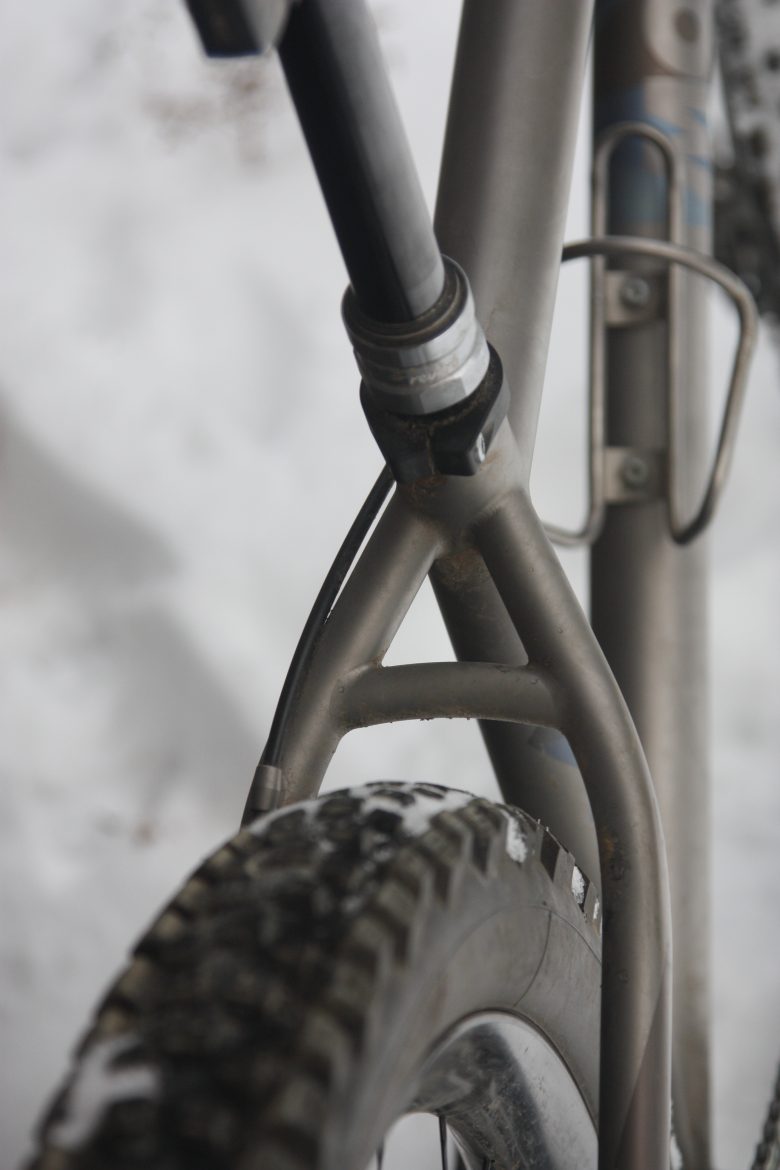

For answers, I turned to Nate Bradley, head of product development at Moots Cycles. In addition to running the mitre shop at Moots, he also spearheaded the Womble. Bradley, I thought, could tell me more about what makes this bike special.
For starters, the Womble is different than anything Moots has built in the past. It’s longer, slacker, and, paired with a burly 140mm Rockshox Pike Ultimate fork and 29×2.5” tires, it’s ready to rip. Until the Womble, the most aggressive bike in the Moots lineup was the Farwell, with its 120mm fork and 68.5° head tube angle. By contrast, the size medium Womble I tested has a 67.2° head tube angle and a 75.7° seat tube angle (at 25% sag)—a significant move toward modern-day MTB geometry charts. And with its lower, longer geometry paired with the 140mm Pike, I was able to rail it on the downs with confidence and speed.
But nearly all of the bikes I’ve ridden recently have had this same kind of long, slack geometry, and at least 130mm of fork travel. So what makes the Womble feel so dialed on the downhill? Well, Bradley had one (admittedly tongue-in-cheek) theory—that “simple equals fast,” and that eliminating the rear shock frees you up to concentrate on the rest of the ride. Maybe he’s right. But I also did some front-center calculations and discovered that the Womble measures 740.7mm from the bottom bracket to the center of the front wheel axle. My Stumpy is only 736mm, meaning the Womble is longer than my trail bike. Additionally, I think what makes the Womble eat up the downhills is the same thing that makes it a rocket ship on the uphills—and it has a lot to do with its tail end.
On the up and up
One of the things I enjoyed most about the Womble was its fast acceleration on uphill corners—or, well, on anything with an uphill slope. Accustomed to having my rear suspension gobble my watts on the ups, I loved the immediate payoff from a well-placed pedal stroke, which, timed correctly, could shoot me up and around a corner with alacrity.
And, yes; most hardtails are good climbers. But the Womble is exceptionally good, due to a noticeably curved seat tube that allows for bigger tires, a steeper, shorter seat tube, and short chainstays. It also has a sporty, somewhat playful vibe that still feels stable at speed (hence those downhill QOMs, I suppose). Before I started riding bikes, I rode horses, and this bike rides exactly like a well-trained trick pony: All of its power is coiled up neatly beneath it, ready to explode the moment you give it the go-ahead. It’s hugely gratifying to experience the power a single pedal stroke yields as it thrusts you forward up the trail.

That curved seat post also addressed the issue of clearance for both tires and dropper post, allowing for aggressive 2.5” Maxxis Assagais (although my tester had 2.6-inch Vittoria Martellos) and a Rockshox Reverb AXS dropper that tucked the saddle neatly out of the way when navigating technical sections.
New titanium tech honed by four decades of experience
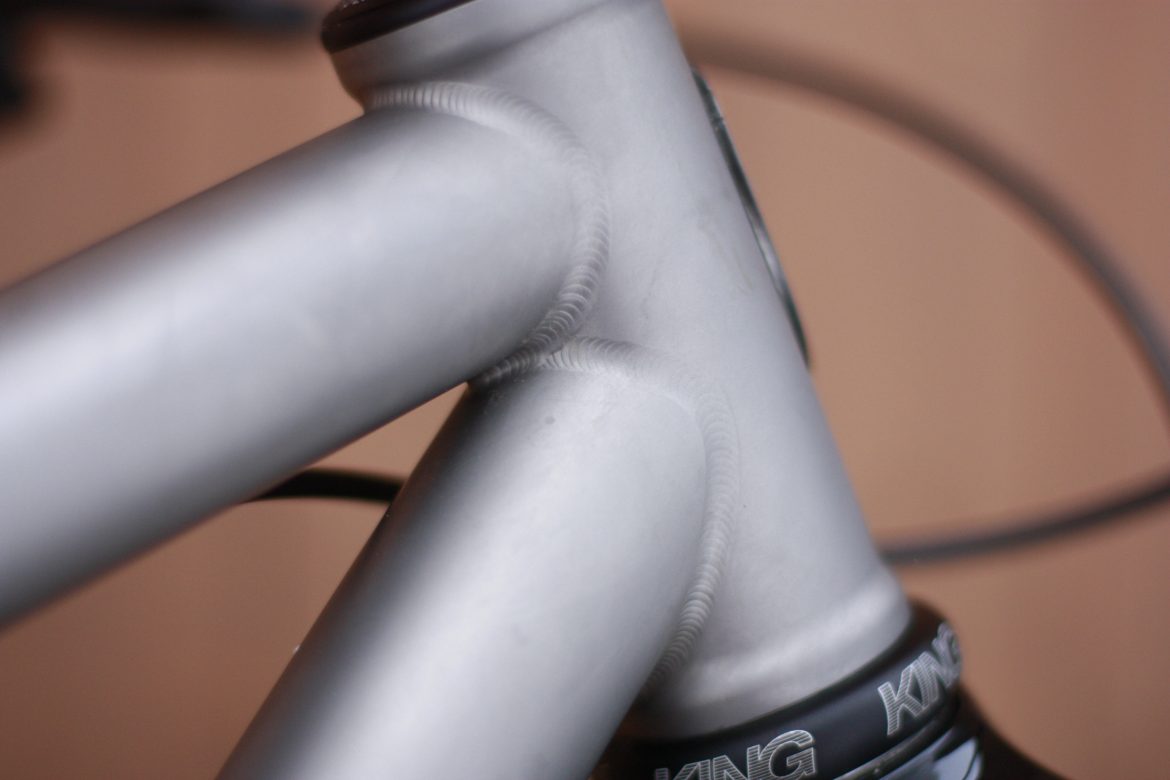
The final thing that sets the Womble apart from the competition is, well, that it’s a Moots. After 40 years working almost exclusively in titanium (they dabbled in steel until 1991), the Moots team has the material totally dialed. But for the Womble, Bradley and his team deviated from the norm, debuting a proprietary double-butted tubing for the top and down tube that’s a wider diameter than anything they’ve ever produced. The material is thicker at the head tube to provide strength, but tapers out in the middle and sides, which Bradley says helps with weight savings and vibration. (As vibrations move through different wall thicknesses, the frequency changes, dampening the reverb you feel).
My only other hardtail is a home-built aluminum hardtail singlespeed with a 100mm fork, so it was hard to do an A/B comparison on the new technology. But as a whole, the Womble feels light, playful, and up for a mega day in the saddle or an epic bikepacking trip. It’s the rig I reached for when I had big multi trail-system day planned, and when I was cruising dirt roads. It’s also the first bike I ever cleared a tabletop jump line on.
Specs and final thoughts
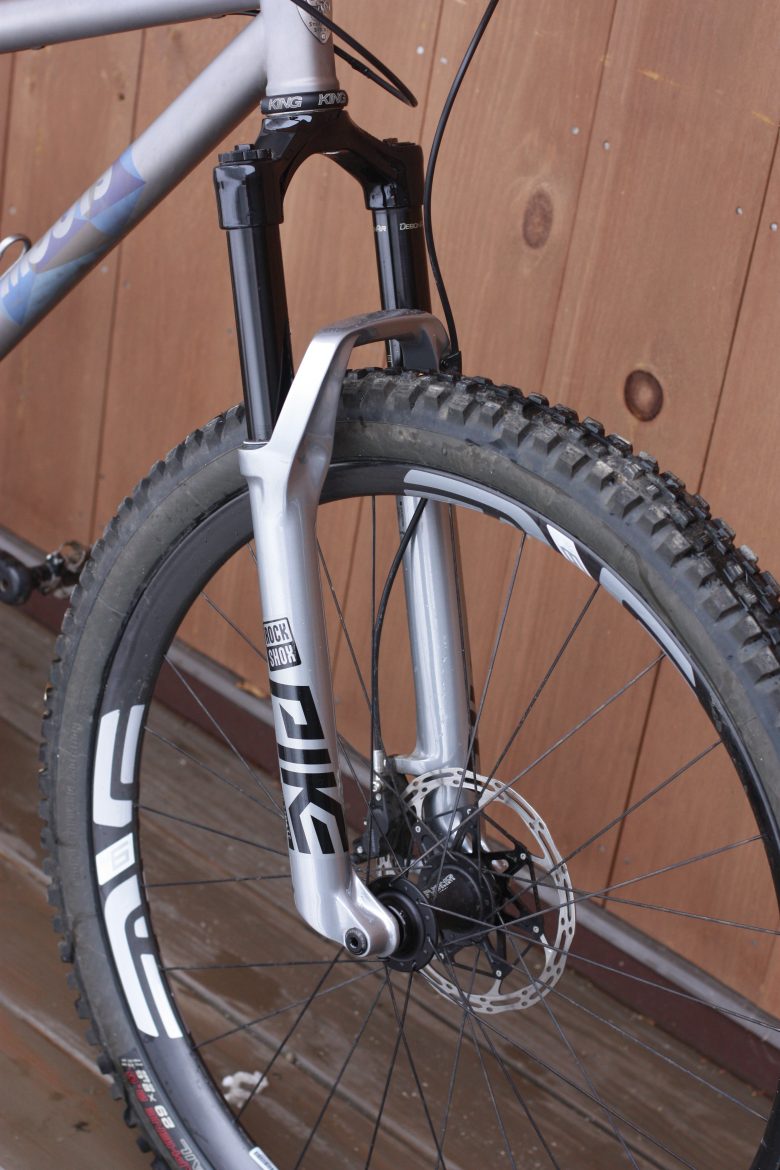



The Womble I tested was Moots’ premium build, with a SRAM X01 Eagle AXS groupset (dedicated 1×12 with room to run a 32T chainring), a SRAM DUB threaded bottom bracket, and SRAM G2 Ultimate brakes. With Chris King hubs and headset, an oil-slick chain and Moots’ jaunty alligator head badge perched out front like a figurehead on a Spanish galleon, this bike has flair—particularly in the new bead-blasted “Facet” finish, inspired by artists like Paul Klee and Bridget Riley. It’s not overdone, though; like most Moots designs, the Womble is all class.
It’s also pricey. The premium build comes in at $9,703, with the 100 ENVE M630 or M635 wheels (with Chris King hubs) adding an additional $1,100. (Which, honestly, probably explains why Moots fans tend to skew slightly older.) Alternatively, you can pick up a frame for $3,749.
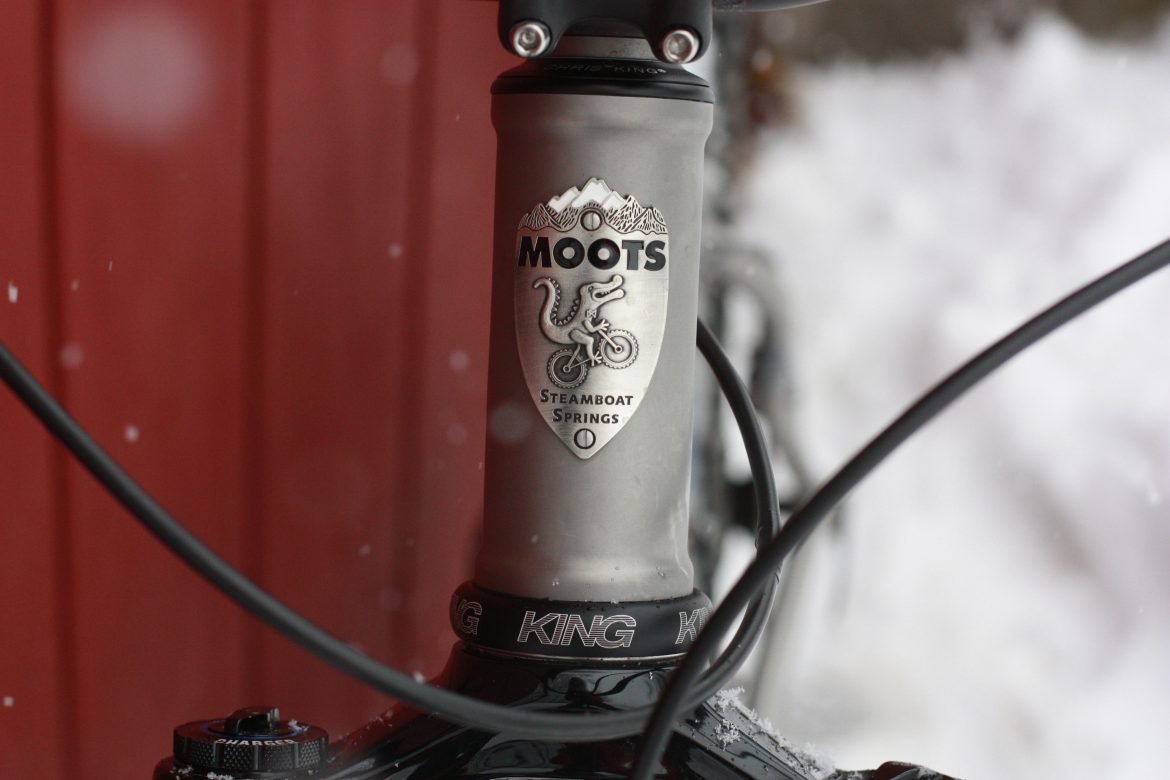
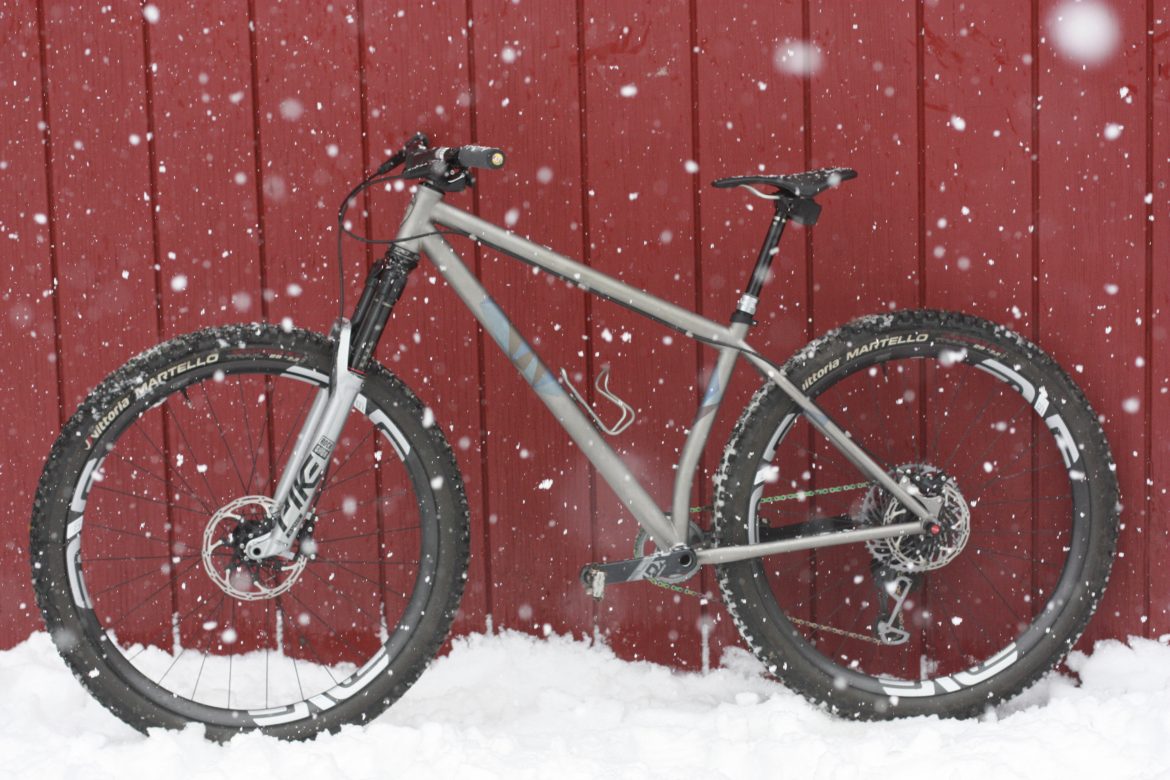
Would this bike be as much fun built up without its premium components and in-house machined frame fittings? Yes. Yes, it would. Would other riders still turn their heads to give it a second look? Yes. And it’s certainly worth considering a frame only, if you’re hardtail-curious. Because while this bike would tick all the boxes as a sumptuous mid-life crisis, it’s also beautifully built and made to last. And that’s precisely why riders love Moots: They build bikes you’ll hold onto for many years. In creating the Womble, Moots took its best stab at creating what they think a modern hardtail mountain bike will look like in 2024—not what they think Moots riders want in 2021.
And there’s a lot of value in taking that perspective to bike building. This might not be the hottest, most progressive bike on the market, but it’s still a highly capable, hugely enjoyable, built-to-endure bike. It’s also precisely representative of what Moots has done so well for the past 40 years, and what they continue to excel at: crafting beautiful, high-end bikes that last. It’s also a heck of a lot of fun to ride—particularly with the knowledge that you’ll be throwing a leg over it for years to come.













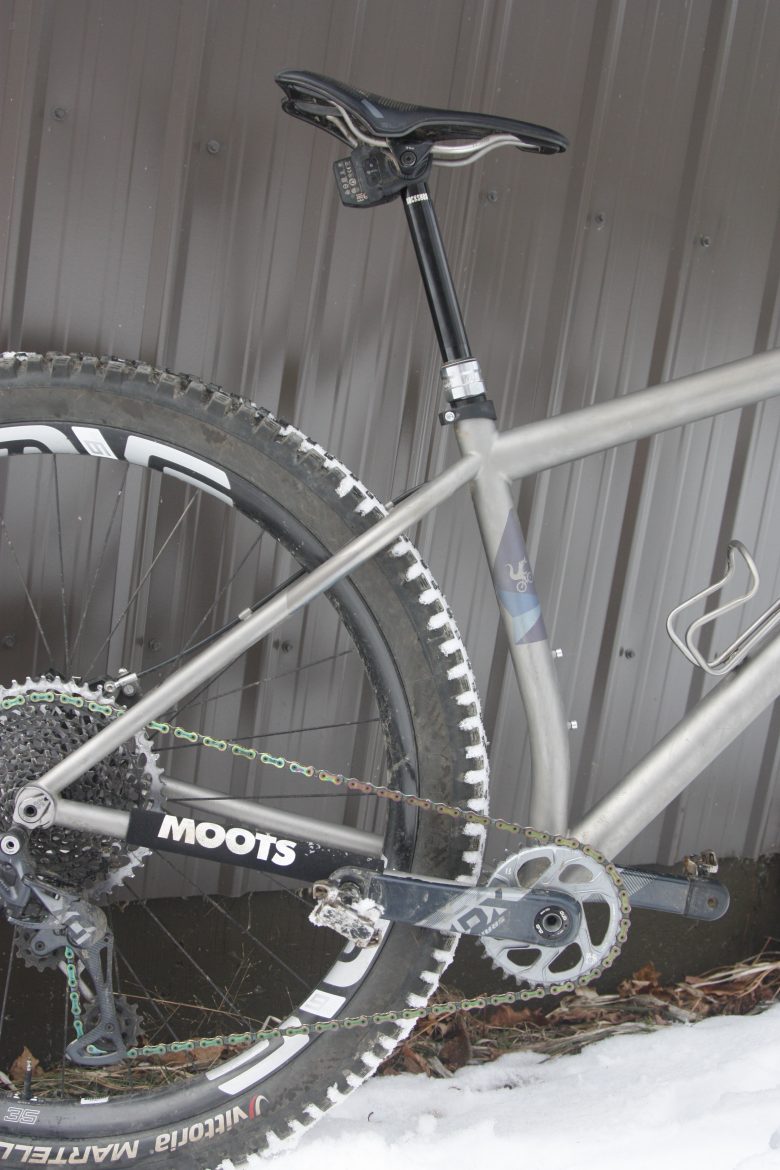
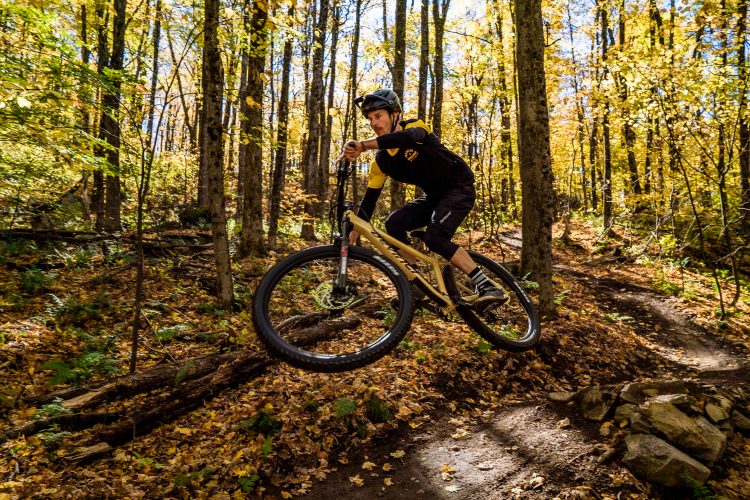








8 Comments
Jan 28, 2021
Apr 10, 2021
Jan 25, 2021
Jan 26, 2021
Jan 26, 2021
Nov 29, 2024
Jan 31, 2021
Jul 4, 2023